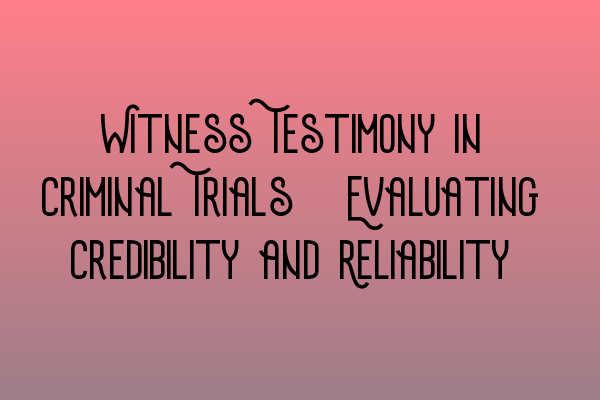Witness Testimony in Criminal Trials: Evaluating Credibility and Reliability
Welcome to the blog of SQE Criminal Law & Practice – your go-to source for all things related to criminal law. In this article, we will delve into the significance of witness testimony in criminal trials and the crucial task of evaluating its credibility and reliability. Understanding how to assess witness testimony is vital for both aspiring solicitors preparing for the SQE exams and practicing lawyers seeking to enhance their advocacy skills.
But before we plunge into the details, let’s take a moment to mention some related articles that could be beneficial for your SQE exam preparation:
- SQE 1 Practice Exam Questions
- SQE 1 Practice Mocks FLK1 FLK2
- SQE 2 Preparation Courses
- SQE 1 Preparation Courses
- SRA SQE Exam Dates
The Role of Witness Testimony in Criminal Trials
Witness testimony plays a crucial role in criminal trials as it provides the court with essential firsthand accounts of events. Whether it is the victim, the accused, or other witnesses, their testimony can significantly influence the outcome of a case. Therefore, it is essential to evaluate the credibility and reliability of witness statements to ensure a fair and just trial.
Factors to Consider in Assessing Credibility
When evaluating the credibility of witness testimony, various factors should be taken into account:
- Consistency: Is the witness’s statement consistent throughout the trial? Any inconsistencies may raise doubts about their credibility.
- Confidence: Did the witness appear confident and self-assured while testifying? Confidence can enhance the reliability of their testimony.
- Corroboration: Is there any external evidence or witness testimony that supports the witness’s version of events?
- Prior Statements: Did the witness make any prior inconsistent statements? Any inconsistency between previous statements and current testimony should be carefully examined.
- Possible Bias: Does the witness have any personal interest or bias that may influence their testimony?
By considering these factors, solicitors can effectively evaluate the credibility of witness testimony, assisting in crafting a compelling case for their clients.
Reliability of Witness Testimony
The reliability of witness testimony is equally significant. Reliability refers to the accuracy and trustworthiness of the information provided by the witness. It is important to assess the following aspects to determine the reliability:
- Perception: Did the witness have a clear view of the events they are testifying about? Factors such as lighting, distance, and obstructions can affect perception.
- Memory: How well does the witness remember the details? Memory can fade over time, especially in stressful situations.
- Timing: Did the witness provide their statement promptly after the event? Delayed reporting may raise questions about the accuracy of their recollection.
A thorough evaluation of both credibility and reliability is crucial to safeguard the rights of the accused and uphold the principles of justice.
Enhancing Advocacy Skills for Solicitors
Aspiring solicitors preparing for the SQE exams should focus on honing their skills in evaluating witness testimony. SQE 2 preparation courses offered by SQE Criminal Law & Practice Law UK can provide comprehensive training to enhance advocacy skills and proficiency in assessing witness credibility and reliability. These courses cover various aspects, including mock trials and practical exercises, allowing students to gain practical experience in evaluating witness testimony.
For those preparing for the SQE 1 exams, it is essential to practice with SQE 1 practice exam questions and SQE 1 practice mocks (FLK1 FLK2). These resources will help you familiarize yourself with the exam format and assess your knowledge in criminal law and procedure.
To stay updated with the latest SQE exam dates, visit our article on SRA SQE Exam Dates.
In conclusion, witness testimony holds immense importance in criminal trials. Through diligent evaluation of credibility and reliability, solicitors can effectively present their case and ensure fair trials. Stay tuned to our blog for more articles on various aspects of criminal law and SQE exam preparation.
